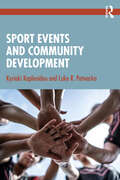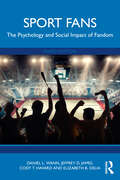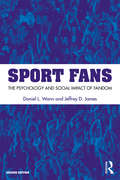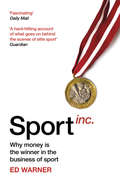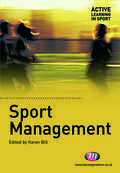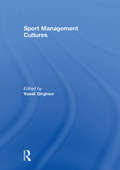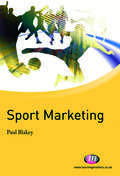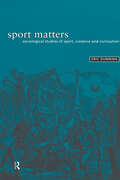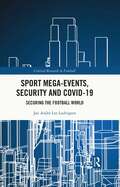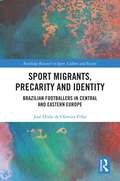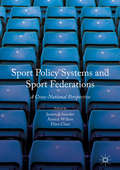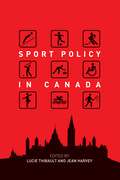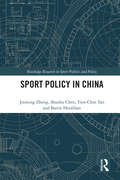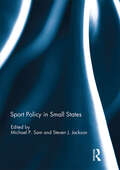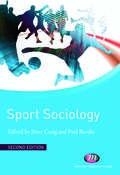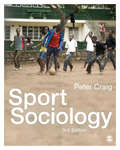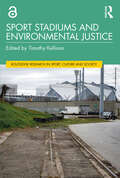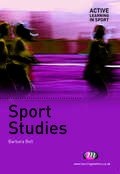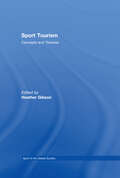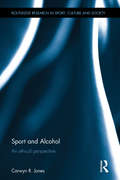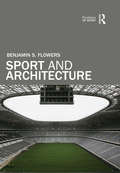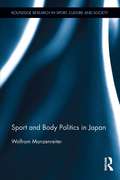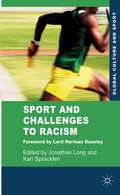- Table View
- List View
Sport Events and Community Development
by Kyriaki Kaplanidou Luke R. PotwarkaThis book examines the relationships between sport event hosting and community development goals. With sport events proliferating around the world, from major events to local events, the book explains how community goals can be embedded into sports event planning, and how events at all levels can be most effectively leveraged to achieve positive outcomes and legacies for local communities.Featuring real-world case studies and the perspective of industry practitioners in every chapter, the book explores the commercial, social, and political contexts in which events take place and what is meant by "legacy" and "impact." It introduces the key stakeholders, from residents and local government to NGOs, as well as the spectrum of goals that might be in play, and looks at partnerships working for the best effect. The book also explains the sports event management process, from bidding to planning to venue management to monitoring and evaluation, and considers how community development goals can, and should, be incorporated at every stage.With a practical focus, and full of useful features for learning and understanding, this is essential reading for any student or practitioner with an interest in sports events, community sport, sport development, event management, or sustainable business.
Sport Fans: The Psychology and Social Impact of Fandom
by Daniel L. Wann Jeffrey D. James Cody T. Havard Elizabeth B. DeliaSports, and the fans that follow them, are everywhere. The third edition of Sport Fans: The Psychology and Social Impact of Fandom examines the affective, behavioral, and cognitive reactions of fans to better comprehend how sport impacts individual fans and society as a whole.Using up-to-date research and theory from multiple disciplines including psychology, sociology, marketing, history, and religious studies, this textbook provides a deeper understanding of topics such as the pervasiveness of sport fandom in society; common demographic and personality characteristics of fans; how fandom can provide a sense of belonging, of uniqueness, and of meaning in life; the process of becoming a sport fan; sport fan consumption; and the future of sport and the fan experience. Thoroughly updated throughout, this new edition includes: New chapters on rivalry between fandoms, and needs met by fandom Increased coverage of fandom for women’s sports and fans Additional sections on how fans react to the emotions of athletes, sport fandom as a platform for social change, attachments to specific sports, spectators at youth sporting events, and local versus nonlocal sports Expanded coverage of research on other targets of identification and what we can learn from this about sport fandom Expertly combining a rigorous level of empirical research and theory in an engaging, accessible format, Sport Fans remains the essential text on sport fan behavior.
Sport Fans: The Psychology and Social Impact of Fandom
by Daniel L. Wann Jeffrey D. James<p>Sports, and the fans that follow them, are everywhere. Sport Fans: The Psychology and Social Impact of Fandom examines the affective, behavioral, and cognitive reactions of fans to better comprehend how sport impacts individual fans and society as a whole. Using up-to-date research and theory from multiple disciplines including psychology, sociology, marketing, history, and religious studies, this textbook provides a deeper understanding of topics such as: <p> <li>the pervasiveness of sport fandom in society <li>common demographic and personality characteristics of fans <li>how fandom can provide a sense of belonging, of uniqueness, and of meaning in life <li>the process of becoming a sport fan <li>sport fan consumption <li>and the future of sport and the fan experience.</li> <p> <p>The text also provides a detailed investigation of the darker side of sport fandom, including fan aggression, as well as a critical look at the positive value of fandom for individuals and society. <p>Sport Fans expertly combines a rigorous level of empirical research and theory in an engaging, accessible format, making this text the essential resource on sport fan behavior.</p>
Sport Inc.: Why money is the winner in the business of sport
by Ed WarnerWhy would someone pull the plug on a Premier League match? What prompts an athlete to search for sponsorship on eBay?How can the decision of a drinks brand CEO make or break an entire sport?Why would a sprinter think they can’t afford not to dope?Sport Inc. reveals the behind-the-scenes finances that drive sport - who gets rich and who gets left on the bench.Through investigations into a wide range of sports, including how football agents really work, the betting industry and corruption, esports, the NFL’s efforts to take over the world and the real cost of hosting events like the World Cup and the Olympics, the financial realities of our obsession with sport are exposed.As spectators our choices make us key players in this game of riches – it’s time to find out who’s winning and who’s losing.
Sport Management (Active Learning in Sport Series)
by Karen BillThis is a core text for all those on Sport Management and Sports Studies courses. It examines both traditional business elements and the new functional areas of management in sport. Key chapters on marketing, finance, entrepreneurship, and event management are included, and the book as a whole provides a critical understanding of the complex and dynamic relationship between sport, business and management. The reader is supported through accessible theoretical explanation, real-life examples and case studies, learning activities and guidance on further study.
Sport Management Cultures
by Vassil GirginovThis is the first book to address the link between culture and sport management. The aim is to demonstrate that culture profoundly affects how we research, teach and practice sport management. The book engages with the concept of culture both as an abstract analytical category and specific beliefs and practices. It recognizes that a single best way of managing does not exist; that the applicability of management theories may stop at national boundaries; and that fundamental cultural values act as a strong determinant to managerial ideology and practice. Culture makes the study of sport management interesting because it challenges many taken-for-granted assumptions about management, yet it reinforces our belief in the existence of common management problems. The book offers a comprehensive review of the conceptualisations of culture and its relation with sport management by examining a range of issues: the emergence of multiculturalism as a policy issue; the impact of commonly shared cultural values within the fitness industry on managers and organisations behaviour; building cultural bridges in community sport organisations; cultural meanings attached to the consumption of Olympic merchandise, and culturally-informed interpretation through a reflective analysis of sport management texts. This book was published as a special issue of European Sport Management Quarterly.
Sport Marketing (Active Learning In Sport Ser.)
by Paul BlakeyThis is a highly accessible text that provides detailed coverage of the key concepts, ideas, principles and techniques of sport marketing. It combines clear and concise explanations with applied case studies, supported by clear objectives, learning activities and points for reflection. UK-based examples are used throughout and the book successfully combines both theory and practice. The field of sport marketing is an exciting and fast-moving part of the sports industry that presents new challenges requiring innovative and effective solutions. Engagement with sport marketing therefore equips students with valuable transferable skills necessary for all sport managers of the future.
Sport Matters: Sociological Studies of Sport, Violence and Civilisation
by Eric Dunning1999 North American Society for the Sociology of Sport Annual Book Award Sport Matters offers a comprehensive introduction to the study of modern sport from a sociological perspective. It covers such topics as the history of sport, the development of ideas of 'fair play', sport and the emotions, the professionalization of sport, race-relations and sport and sport and gender.Unique in its cross-cultural analysis, it uses examples from around the globe, including sports spectator violence in North America, the growth of international soccer and the role of sport in the European identity.
Sport Mega-Events, Security and COVID-19: Securing the Football World (Critical Research in Football)
by Jan Andre LudvigsenThis book examines contemporary issues of security at sports mega-events (SMEs). It focuses on the 2020 UEFA European Football Championship (Euro 2020) - subsequently postponed to 2021 - the third biggest SME in the global sporting calendar and a unique multi-city, multi-country event that took place in the eye of the COVID-19 storm. Drawing on stakeholder interviews, policy documents, media sources and existing research, the book explores the constructions, meanings, and perceptions of security in the efforts to secure this football mega-event. It argues that Euro 2020 is a powerful case through which to better understand wider security governance and security-related processes in present-day societies, which are increasingly preoccupied with notions of ‘security’, ‘safety’ and ‘risk’. It assesses the precautionary logic and transnational knowledge transfer processes that guide security constructions surrounding SMEs in an uncertain and threat-conscious world, and captures the dramatic moments in which COVID-19 transitioned into a security threat with severe impacts on the world of football and well beyond. Sport Mega-Events, Security and COVID-19 advances existing debates in the sociology of football and sport, offering a critical understanding of security and safety in the modern world, and giving an insight into the changing ‘new normalities’ of security between 9/11 and the COVID-19 pandemic through the lens of global sport. This is a fascinating reading for anybody with a professional or academic interest in sport management, event management, football, security studies, policing, risk and crisis management, the sociology of sport, the sociology of surveillance, or political science.
Sport Migrants, Precarity and Identity: Brazilian Footballers in Central and Eastern Europe (Routledge Research in Sport, Culture and Society)
by José Hildo de Oliveira FilhoThis book takes a close look at the experiences of migrant athletes, their precarious careers, and at what this can tell us about wider themes of globalisation, identity, race, gender, and the body.Based on in-depth ethnographic research on male Brazilian footballers and futsal players working in Central and Eastern Europe, this book helps to fill gaps in previous research on sports migration and global sports labor markets. This book uses life-history interviews to reveal how race, gender, and class are articulated in the everyday experiences of migrant athletes; how they express their religious affiliations; and how they navigate the relationships with injuries and pain that are characteristic of precarious athletic careers. This book considers the transnational networks that are essential in sustaining international athletic labor flows and the role that borders and emotions play in the lives of sports migrants and also the agency that migrant athletes can have in issues such as player development and retention.Presenting a more nuanced, ground-level perspective on sports migration and the sociological dialogue between identity, culture, and the body, this book is fascinating reading for anybody with an interest in the socio-cultural study of sport, migration, globalization, or global inequalities.
Sport Policy Systems and Sport Federations
by Jeroen Scheerder Annick Willem Elien ClaesThis book explores the organisation and structure of sport in and beyond Europe. Drawing on up-to-date data, the collection's main focus lies on the relationship between public sport policy structures and sport (con)federations. The authors present thirteen country-specific contexts wherein sport policy systems are embedded, providing in-depth descriptions and analyses and framed within a solid academic and theoretical framework. This volume will be of interest to students and scholars of Sociology of Sport, Sport Management and Sport Policy.
Sport Policy in Canada (Open Access)
by Jean Harvey Lucie ThibaultSport Policy in Canada provides the first and most comprehensive analysis of the new Canadian Sport Policy adopted in 2012. In light of this new policy, the authors, top scholars in the field, provide detailed accounts of the most salient sport policies and programs, while also discussing issues and challenges facing policy makers. In Canada and around the world, the last decades have known a sharp increase in state intervention and public funding in pursuit of medals on the international stage and in support of a more active lifestyle. Governments at all levels have made substantial investments in hope of hosting major sporting events to benefit from the economic impact and gain international prestige.The study of sport policies, often neglected in the past, is becoming an increasingly important research topic. Sport Policy in Canada seeks to fill this void by offering the most comprehensive analysis of sport policy since Macintosh, Bedecki, and Franks' Sport Policy in Canada (1987). - This book is published in English.
Sport Policy in China (Routledge Research in Sport Politics and Policy)
by Barrie Houlihan Jinming Zheng Shushu Chen Tien-Chin TanAcknowledging China’s established status as a global sporting superpower, this is the first book to systematically investigate sport policy in that country. With a focus on sport development in the most recent three decades, Sport Policy in China explores a wide range of topics in Chinese sport, including elite sport development, professional sports, major sports events, sport for all, the political context within which sport is interiorised and the distinctive sporting status of Hong Kong. It examines the debates around policy, globalisation, diplomacy and soft power, as well as the significance of the principle of ‘one country, two systems’. With international appeal, this book is a valuable resource for students and researchers in the fields of sport policy, sport management, sport development and sport sociology.
Sport Policy in Small States
by Steven J. Jackson Michael P. SamFor small nations like Grenada, New Zealand and Norway, medal counts relative to population are increasingly touted as the most meaningful comparisons with sporting superpowers China, the United States and Germany. In acknowledging that 60% of the world’s states have populations of less than 10 million and 48% of these have less than 5 million inhabitants, this book explores how the ‘minnows’ can build or sustain their sport programmes. Despite the immense variation among and between small states, this book suggests that scale ‘matters’. The contributors, from Antigua and Barbuda, Finland, Lebanon, Norway, New Zealand, and Sweden demonstrate the challenges and opportunities of governing sport in their respective countries. These works highlight the distinctive policy ‘ecologies’ of sport in small states, marked by the unique responses to global pressures, the domestic realities of having limited resources, and by the close-knit networks of accountability. This volume will help scholars and policy makers to better understand the significance of having fewer ‘degrees of separation’ and the implications this has for sport.This book was published as a special issue of the International Journal of Sport Policy and Politics.
Sport Sociology
by Peter Craig Paul BeedieSociology is central to the study of sport in higher education. This reader-friendly textbook introduces all of the subject’s core themes, such as power, diversity and mediation, and relates them to major contemporary social issues such as commercialisation and globalisation. Special emphasis is given throughout to examples drawn from the UK and to the significance of the 2012 Olympics. Theoretical explanation is fully supported by case studies, practical and reflective exercises and guidance on further study.
Sport Sociology (Active Learning in Sport Series)
by Peter CraigAny study of sport is incomplete without consideration of its social function and structures, its economic impacts both locally and globally, and its political dimension – particularly when used by nations for competitive gain. Sport Sociology provides a comprehensive overview for any student taking a course on the subject at college or university, including both established and emergent themes, from issues around power, diversity and consumerism through to newer topics such as the digital environment and climate change – both now covered in new individual chapters. Other chapters have been fully revised to include up-to-date literature and case studies, as well as new key terms and reflective tasks. A new ‘Key Thinker’ box feature included in each chapter introduces readers to an esteemed theorist relevant for the chapter topic to help link theoretical concepts to practice and offer up suggestive research directions for student assessment.
Sport Sociology (Active Learning in Sport Series)
by Peter CraigAny study of sport is incomplete without consideration of its social function and structures, its economic impacts both locally and globally, and its political dimension – particularly when used by nations for competitive gain. Sport Sociology provides a comprehensive overview for any student taking a course on the subject at college or university, including both established and emergent themes, from issues around power, diversity and consumerism through to newer topics such as the digital environment and climate change – both now covered in new individual chapters. Other chapters have been fully revised to include up-to-date literature and case studies, as well as new key terms and reflective tasks. A new ‘Key Thinker’ box feature included in each chapter introduces readers to an esteemed theorist relevant for the chapter topic to help link theoretical concepts to practice and offer up suggestive research directions for student assessment.
Sport Sociology (Active Learning in Sport Series)
by Peter CraigAny study of sport is incomplete without consideration of its social function and structures, its economic impacts both locally and globally, and its political dimension – particularly when used by nations for competitive gain. Sport Sociology provides a comprehensive overview for any student taking a course on the subject at college or university, including both established and emergent themes, from issues around power, diversity and consumerism through to newer topics such as the digital environment and climate change – both now covered in new individual chapters. Other chapters have been fully revised to include up-to-date literature and case studies, as well as new key terms and reflective tasks. A new ‘Key Thinker’ box feature included in each chapter introduces readers to an esteemed theorist relevant for the chapter topic to help link theoretical concepts to practice and offer up suggestive research directions for student assessment.
Sport Stadiums and Environmental Justice (Routledge Research in Sport, Culture and Society)
by Timothy KellisonThis book explores the local environmental impact of sports stadiums, and how that impact can disproportionately affect communities of color. Offering a series of review articles and global case studies, it illustrates what happens when sport organizations and other public and private stakeholders fail to factor environmental justice into their planning and operations processes. It opens with an historical account of environmental justice research and of research into sport and the natural environment. It then offers a series of case studies from around the world, including the United States, Canada, Kenya, South Africa, and Taiwan. These case studies are organized around key elements of environmental justice such as water and air pollution, displacement and gentrification, soil contamination, and transportation accessibility. They illustrate how major sports stadiums have contributed positively or negatively (or both) to the environmental health of the compact neighborhoods that surround them, to citizens’ quality of life, and in particular to communities that have historically been subjected to unjust and inequitable environmental policy. Placing the issue of environmental justice front and center leads to a more complete understanding of the relationship between stadiums, the natural environment, and urban communities. Presenting new research with important implications for practice, this book is vital reading for anybody working in sport management, venue management, mega-event planning, environmental studies, sociology, geography, and urban and regional planning.
Sport Studies (Active Learning in Sport Series)
by Barbara Bell"A comprehensive, useful and informative practical book that draws from a range of disciplines. In particular, the learning activities provides some useful group and reflective discussions." - Heather Allison, London Metropolitan University "This book supports our year undergraduate students. The case studies and links with UK programmes provides relevant information to discuss and investigate. Easily accessible." - Emerick Kaitell, Roehampton University This is an accessible and comprehensive introductory textbook for students on sport studies courses. It brings together perspectives drawn from a range of disciplines, especially sociology, history and philosophy, with detailed information on the key political, legal, economic and vocational issues relating to sport. Written specifically for students based in the UK, the text examines the full range of topics relevant to sport studies and is fully supported with learning activities, suggestions for further study, and guidance on how to progress and succeed in the subject.
Sport Tourism (Sport in the Global Society)
by Heather GibsonThe study of sport tourism is on the cusp of moving from a descriptive phase of research into an analytical phase. Consequently, many academics and graduate students are searching for theories upon which to ground their work. This book draws upon theories and concepts from sociology and anthropology (the socio-cultural perspective), sport and tourism studies, and business studies. One of the dangers of a new area of study is that the body of knowledge is built on a range of seemingly unrelated studies. By grounding work in a theoretical perspective, future work can be linked to, and contribute to building a cohesive understanding of various aspects of sport tourism. This book is an edited collection written by some of the top scholars working in a particular domain throughout the world, providing a compendium of theories and concepts that can be used to frame research on various aspects of sport tourism.This volume was previously published as a special issue of the journal Sport in Society.
Sport and Alcohol: An ethical perspective (Routledge Research in Sport, Culture and Society)
by Carwyn Rh. JonesThere is a clear sense in which sport has played, and continues to play an important role in the normalization and legitimization of routine, excessive and problem drinking; sport and alcohol have become inextricably linked. Alcohol companies provide funding in the form of sponsorship, fans consume alcohol when watching, and players celebrate, bond and relax with alcohol. Sport and Alcohol: an ethical perspective aims to critically examine the various ways in which sport and alcohol interact. In doing so, the book casts an ethical eye over the following topics: Society’s relationship with alcohol Sponsorship and marketing of alcohol through sport and its effect on children Sport’s alcohol-tolerant ethos, problematic drinking practices and rituals Punishment and discipline in relation to athletes’ drink-related bad behavior Alcoholism in the context of sport and the need for a greater understanding of the condition, how it develops and what can be done The status of athletes as role models Offering a much-needed critical assessment of an important issue in contemporary sport and society, Sport and Alcohol is essential reading for those interested in the social, cultural or philosophical study of sport in general and sport and alcohol in particular.
Sport and Architecture (Frontiers of Sport)
by Benjamin S. FlowersSport and architecture are two elements of contemporary life that have a broad and profound impact on the world around us. The role architecture plays in shaping buildings and societies has occupied historians for centuries. Likewise, the cultural, economic, and political importance of sport is the subject of sustained academic inquiry. When sport and architecture converge, as in the 2012 London Olympics or the 2014 World Cup in Brazil, then the impact of these two forms of social activity is redoubled. This book presents a new and dynamic study of the complex relationship between sport and architecture. It explores the history of sport architecture and examines the buildings and events that create sites where sport and architecture converge in particularly telling ways. Its chapters discuss the following topics: sport architecture and urban redevelopment sport architecture and technology sport architecture and nationalism sport architecture as social activism sport architecture and global capitalism. By considering the importance of architectural form alongside these key themes, this book represents a landmark study for anybody interested in the social and cultural significance of architecture or sport.
Sport and Body Politics in Japan (Routledge Research in Sport, Culture and Society #26)
by Wolfram ManzenreiterThere is more to Japanese sport than sumo, karate and baseball. This study of social sport in Japan pursues a comprehensive approach towards sport as a distinctive cultural sphere at the intersection of body culture, political economy, and cultural globalization. Bridging the gap between Bourdieu and Foucault, it explains the significance of the body as a field of action and a topic of discourse in molding subject and society in modern Japan. More specifically, it provides answers to questions such as how and to what purposes are politics of the body articulated in Japan, particularly in the realm of sport? What is the agenda of state actors that develop politics aiming at the body, and to what degree are political and societal objectives impacted by commercial and non-political actors? How are political decisions on the allocation of resources made, and what are their consequences for sporting opportunities and practices of the body in general? Without neglecting the significance of sport spectatorship, this study takes a particular angle by looking at sport as a field of practice, pain and pleasure.
Sport and Challenges to Racism
by Jonathan Long Karl SpracklenWith an international line-up of contributors, this book examines challenges to racism in and through sport. It addresses the different agents of change in the context of wider socio-political shifts and explores issues of policy formation, practices in sport and anti-racism in sport, and the challenge to sport today.
